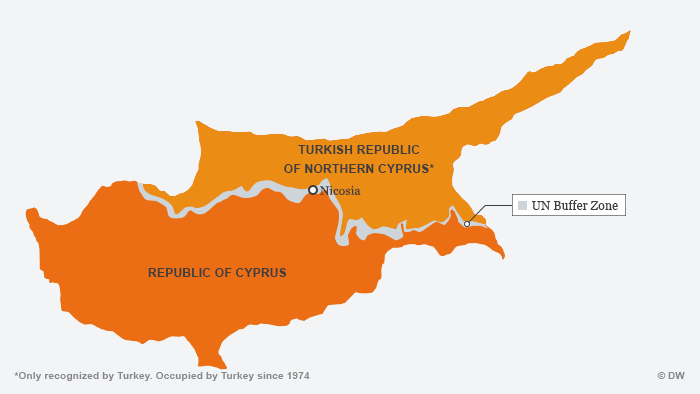CYPRIOT PRESIDENTS READY TO RESUME STALLED TALKS
- Albanian Shqip
- Amharic አማርኛ
- Arabic العربية
- Bengali বাংলা
- Bosnian B/H/S
- Bulgarian Български
- Chinese 中文
- Croatian Hrvatski
- Dari دری
- English English
- French Français
- German Deutsch
- Greek Ελληνικά
- Hausa Hausa
- Hindi हिन्दी
- Indonesian Bahasa Indonesia
NEWS
Cypriot presidents ready to resume stalled talks
Turkish and Greek Cypriot leaders have said they are open to resume peace talks after they stalled again this week. The two sides are deadlocked over the issue of territory and security.
Greek Cypriot President Nicos Anastasiades said on Wednesday he was willing to resume UN-sponsored peace talks with Turkish Cypriots after the latest round of talks to reunite the island stalled earlier this week.
Anastasiades and his Turkish Cypriot counterpart Mustafa Akinci met for two days in Switzerland this week, but talks collapsed on Tuesday after the two sides failed to reach an agreement on the internal borders of a future bi-communal federal state.
"I want to assure that I am determined and ready to take the necessary steps to continue the dialogue," Anastasiades said in a televised address on Wednesday, adding he was in contact with EU leaders to ensure the door remains open to further talks. "I am ready to continue the dialogue where it broke off," he said.
Akinci, meanwhile, said he spoke with US Vice President Joe Biden, who has led Washington's diplomacy on the Cyprus conflict, and confirmed his continued desire to reach a solution to the conflict despite the latest deadlock. Turkish Cypriot media also reported Akinci delivered a similar message to the UN.
Both leaders' comments come after UN Secretary General Ban Ki-moon on Wednesday warned both sides to not miss a "historic opportunity" to end one of the world's most intractable political problems.
Both Cypriot leaders have expressed optimism that peace talks that began in 2014 could yield a peace agreement to unite the island under a federal structure by the end of 2016. This would be followed by a public referendum in 2017.
Cyprus has been divided between a Turkish north and internationally recognized Greek south since 1974, when the Turkish military intervened after a junta in Athens orchestrated a Cypriot coup to unite the island with Greece.
Inter-communal violence and the Turkish intervention displaced thousands, mostly Greeks. This has made the territorial boundaries of a future bi-communal federation and population transfers major sticking points in the talks before they advance to the issue of security.
While Turks made up about 18 percent of the population in 1974, the Turkish military intervention left them in control of about a third of the island's territory.
Anastasiades said the two sides had come close to agreeing on the amount of territory to remain under Turkish Cypriot administration, with Akinci suggesting 29.2 percent and the Greek Cypriots proposing 28.2 percent. That would be a loss of about 7 or 8 percent of what the Turkish Cypriots now control.
According to a UN estimate, such an arrangement would mean between 78,200 and 94,500 Greeks would get back homes and property that would be within the Greek Cypriot federal zone's enlarged border. Akinci has called for no more that 55,000 Greek Cypriots to return initially, and to later increase that to 65,000, Anastasiades said.
Akinci said on Tuesday he understood Greek Cypriots who were displaced earlier would get back property, but that this couldn't trample on the rights of Turks.
Redrawing the border would see communities displaced again from their current homes. For example, Anastasiades has pushed for the return of Morphou, a town currently in the Turkish-controlled north. Akinci has said he would not agree to a deal that would force 18,000 Turkish Cypriot residents in the town to be uprooted a second time in 42 years.
Each side needs to be able to return to their citizens with a deal that would be supported in a referendum. A UN-backed referendum in 2004 to reunite the island was accepted by Turkish Cypriots hoping it would allow them to join the European Union, but it was rejected by Greek Cypriots.
Another major stumbling block has been security. Turkey has about 30,000 troops stationed in northern Cyprus. Turkish Cypriots want Turkey to maintain its military on the island and have to the right to intervene if the deal breaks down, something the Greek side flatly rejects.
As part of the negotiations, Anastasiades said the security issue was to be agreed on in the final phase of talks with the participation of Greece, Turkey and former colonial ruler Britain after an agreement on territory is reached.
In a statement on Wednesday, the Turkish presidency's office said both Greece and Greek Cypriots were trying to get a final decision on territory without addressing security and other issues as part of a final agreement.
“Unfortunately, our counterparts have made efforts to finalize the chapter of territory, according to their own demands, and at the initial stages of the negotiations, which was actually an issue to be finalized at the five-party-conference negotiations that will be held simultaneously at the same venue, but at different negotiating tables," Akinci said in a statement posted on the Turkish Cypriot presidency's website.
"They aimed at stripping us of our power to negotiate. Instead of focusing on an initial map that will be dealt at a five-party-conference, they planned to almost finalize territorial adjustment according to their own demands by insisting on the number of people who will return” Akinci said.
Anastasiades accused the Turkish Cypriot side of attempting bundle the territory issue with the security arrangements, which should be agreed upon separately.
Four issues remain to be resolved, with territory and security representing the main hurdles.
cw/bw (AFP, AP)





Comments